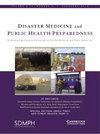掉头,别溺水:洪水中与机动车相关的溺水风险因素及其预防策略的系统回顾
IF 1.9
4区 医学
Q3 PUBLIC, ENVIRONMENTAL & OCCUPATIONAL HEALTH
引用次数: 0
摘要
目标 洪水是自然灾害造成的最普遍的灾害之一,它增加了溺水的风险。驾车通过被洪水淹没的水道是洪水导致溺水死亡的一个原因,尤其是在洪水多发地区。本研究旨在确定洪水中机动车相关溺水的风险因素及其预防策略。方法 检索 2000 年至 2022 年期间的国际和国内数据库(WOS、PubMed、Scopus、Google Scholar、Magiran 和 SID)。纳入了调查与洪水中陆地机动车相关溺水的风险因素及其预防策略的研究,并使用主题内容分析法进行了分析。结果 在 14 项符合条件的研究中,确定了洪水中陆地机动车相关溺水的风险因素,并将其分为 3 个子主题:驾驶员(3 个类别:社会人口特征、知识和态度、信仰);技术(1 个类别:陆地机动车);环境(2 个类别:物理环境和社会经济环境)。提出了物理和结构性措施(1 类:改善道路安全)和非结构性措施(4 类:研究和教育以及提高认识、风险管理、促进社会认知信念、重建和改善法律基础设施)作为溺水预防策略。结论 驾驶员的知识、态度和信念、车辆和环境是驾车通过洪水水道的最重要风险因素。在设计未来干预计划和物理及结构策略时,应考虑这些因素,以遏制这种危险且可能致命的驾驶行为。本文章由计算机程序翻译,如有差异,请以英文原文为准。
Turn Around, Don’t Drown: A Systematic Review of Risk Factors for Motor Vehicle–Related Drowning in Floods and its Preventive Strategies
Objective Exposure to flood, one of the most widespread disasters caused by natural hazards, increases the risk of drowning. Driving through flooded waterways is a cause of death due to flood-related drowning, especially in flood-prone areas. This study aimed at identifying the risk factors for motor vehicle–related drowning in floods and its prevention strategies. Methods International and national databases (WOS, PubMed, Scopus, Google Scholar, Magiran, and SID) were searched in the time span from 2000 to 2022. The studies investigating the risk factors relevant to land motor vehicle–related drowning in floods and its prevention strategies were included and analyzed using thematic content analysis. Results In 14 eligible studies, risk factors for land motor vehicle–related drowning in floods were identified and categorized in 3 subthemes: driver (3 categories: socio-demographic characteristics, knowledge and attitude, and beliefs); technology (1 category: land motor vehicles); and environment (2 categories: physical and socio-economic environment). Physical and structural measures (1 category: road safety improvement) and nonstructural measures (4 categories: research and education and raising awareness, risk management, promoting social-cognitive beliefs, and reconstruction and improvement of legal infrastructure) were proposed as drowning prevention strategies. Conclusions The knowledge, attitude, and belief of the driver; the vehicle; and the environment were the most important risk factors of driving through flooded waterways. These factors should be considered when designing programs and physical and structural strategies for future interventions to curb this dangerous and potentially fatal driving behavior.
求助全文
通过发布文献求助,成功后即可免费获取论文全文。
去求助
来源期刊

Disaster Medicine and Public Health Preparedness
PUBLIC, ENVIRONMENTAL & OCCUPATIONAL HEALTH-
CiteScore
4.40
自引率
7.40%
发文量
258
审稿时长
6-12 weeks
期刊介绍:
Disaster Medicine and Public Health Preparedness is the first comprehensive and authoritative journal emphasizing public health preparedness and disaster response for all health care and public health professionals globally. The journal seeks to translate science into practice and integrate medical and public health perspectives. With the events of September 11, the subsequent anthrax attacks, the tsunami in Indonesia, hurricane Katrina, SARS and the H1N1 Influenza Pandemic, all health care and public health professionals must be prepared to respond to emergency situations. In support of these pressing public health needs, Disaster Medicine and Public Health Preparedness is committed to the medical and public health communities who are the stewards of the health and security of citizens worldwide.
 求助内容:
求助内容: 应助结果提醒方式:
应助结果提醒方式:


